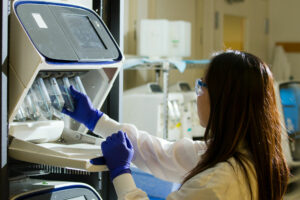Celebrating PHL biotechnology

At its simplest, biotechnology is technology based on biology. It harnesses cellular and biomolecular processes to develop technologies and products that help improve people’s lives and the health of our planet, said the Biotechnology Innovation Organization (BIO).
National Biotechnology Week, held every last week of November in the country, promotes the safe and responsible use of modern biotechnology and its products as a means to achieve and sustain food security, equitable access to health services, a sustainable and safe environment, and industry development.
With the theme “Responding to the Challenges: Business Opportunities in Biotechnology,” the 18th edition celebrated the contributions of the country’s biotechnology sector.
Biotherapeutic medicines, also called biotech drugs or biologics, are derived from proteins and other substances produced by living organisms, such as mammalian cells, viruses and bacteria. With a unique and diverse range of specific targets, biotherapeutic medicines open new avenues for delivering cutting-edge treatments for numerous diseases and wide patient populations.
In the last 30 years, biotherapeutics have become an important part of modern medicine. Insulin, used by diabetics to regulate blood sugar, was the first modern medicine produced using biotechnological methods. Since then, many biotherapeutic medicines delivered by the research-based biopharmaceutical industry have been developed and licensed to treat serious illnesses including cancer, heart disease, multiple sclerosis, anemia, and rheumatoid arthritis.
The International Federation of Pharmaceutical Manufacturers and Associations (IFPMA) said that biotherapeutic medicines benefit more than 350 million patients worldwide, treating widespread diseases such as cancer and diabetes, as well as rare illnesses. Being similar in structure to molecules naturally produced in the human body, biotherapeutic medicines have great therapeutic impact in many disease areas and can additionally serve to diagnose other diseases. They have moreover proven to be effective in the treatment of conditions that had not been positively addressed by chemically synthesized small molecule medicines.
Over the past 30 years, medical advances in biotherapeutic medicines have focused on treating many chronic diseases — including cancer, diabetes, hepatitis C, and chronic renal failure — as well as less common ones such as hemophilia, Fabry’s disease, growth deficiency, multiple sclerosis and Crohn’s disease.
Until the 1980s, insulin extracted from animals was used to treat diabetes. In 1982, researchers produced human insulin of superior quality by recombinant DNA technology using a culture of E. coli bacteria. This became the first approved biotherapeutic product. Human insulin benefits today the vast majority of diabetic patients who require insulin treatment.
Major strides in fighting cancer successfully go hand in hand with improved diagnostics, treatments and prevention methods. Biotherapeutic medicines play a role in the discovery and development of biomarkers. Today, biomarkers help in predicting the risk of cancer, diagnosing it, and indicating a potential effective course of treatment.
If left untreated, autoimmune diseases such as Crohn’s disease and rheumatoid arthritis can lead to early mortality. Biotherapeutic medicines have proved successful and have had a highly positive impact in the treatment of these diseases.
As with all medicines, the research and development process for biotherapeutics involves a high degree of scientific and economic risk, so there is a need for strong intellectual property rights, to stimulate the incentive to innovate. When developing biotherapeutics, years of research focus on finding the right organism and manufacturing conditions to produce the required protein or antibody. A small change in the manufacturing process can affect the final product. That’s why precision and conformance to scientific requirements are necessary to ensure their quality, safety, and efficacy. In this context, scientists must create the right environment for cells to isolate and purify the biotherapeutic protein so it’s exactly the right product every time.
Examples of available biotherapeutic medicines include Anti-CD20 for cancer and rheumatoid arthritis; Anti-HER2 for cancer; Anti-TNFs for rheumatoid arthritis, psoriasis, Crohn’s disease, and ulcerative colitis; Anti-VEGF for cancer and macular degeneration; Bone Morphogenic Protein-7 for bone repair; Consensus Interferon for hepatitis C; Erythropoietin for chronic anemia; and Follicle-Stimulating Hormone (FSH) for infertility among many others. And biotechnology has recently been used for coronavirus disease 2019 (COVID-19) treatments.
With biotechnology applied to health, patients are leading healthier lives — often without realizing the source of biotherapeutic medicines.
Teodoro B. Padilla is the executive director of the Pharmaceutical and Healthcare Association of the Philippines (PHAP), which represents the biopharmaceutical medicines and vaccines industry in the country. Its members are at the forefront of research and development efforts for COVID-19 and other diseases that affect Filipinos.




